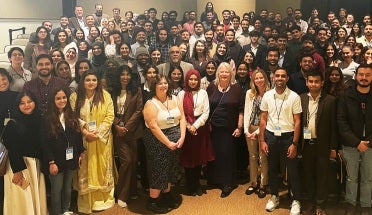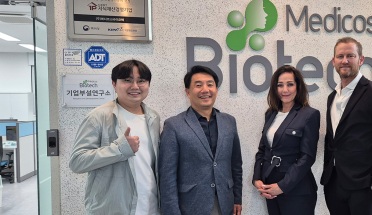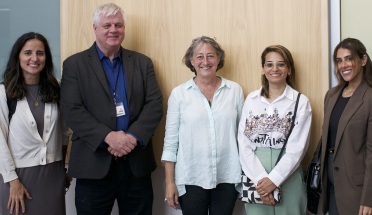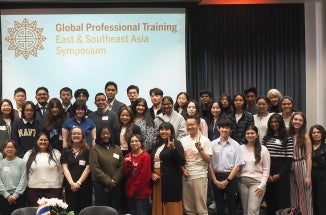
Student Ambassadors Make Impact with Global Professional Training: East and Southeast Asia
- Apr 9, 2025
- Global Customized Programs
- by Sophia Baca
Preceding the onset of Year of the Snake, it might have been surprising to see a team of lions dancing for a room full of Longhorns. But that’s exactly the kind of cultural programming an attendee could expect at The University of Texas at Austin’s Global Professional Training: East and Southeast Asia 2025 Symposium.
Performers from the Texas Southern Sea Dragon and Lion Dance Association danced onstage and moved from table to table, allowing students and guests to pet the giant “animals” costumed in red fringe. The traditional cultural performance provided levity and fitting entertainment for attendees after a full day of professional programming at the event, known as GPT Asia.

Since 2015, this free, internationally focused experience has offered information for students aspiring to careers in East and Southeast Asia, helping them develop marketable skills while exploring relevant career, course and program options.
GPT Asia is a product of the University’s commitment to preparing Longhorns for life as global citizens and providing support to help them succeed in every corner of the world. Students with a variety of career aspirations and majors — or simply a general interest in the region — can benefit from the networking events, workshops and cultural experiences that take place every year at GPT Asia.
The program owes its robust existence to the generous support of esteemed alumni and donors Judy and Bill Bollinger (BBA ’78 and MBA ’80), whose extensive international business experience, particularly in Singapore, helped them recognize that the region holds immense opportunities for UT graduates. With Texas Global and other University stakeholders, the Bollingers established and funded GPT Asia and other transformative initiatives to bolster students’ educational and professional development with international perspectives that set them up for success.
During the symposium and subsequent programming throughout the spring semester, students can learn how to build their cross-cultural professional competencies and global networks, receiving candid career advice from professionals in the region. This unique program addresses specific facets of career preparation such as language barriers and societal differences, eliciting discussions that are especially relevant for students who plan to work in the region.
Cultivating Professional Development
To extend learning beyond the one-day symposium, attendees may opt to further cultivate professional development in this space by serving as GPT Asia Student Ambassadors afterward. The group participates in intercultural programming across campus, including local exchange programs with international visitors, globally oriented career development activities and workshops with relevant professionals.
These students are also offered the option to join the Student Ambassador Events Committee in the academic year following the symposium. This smaller group collaborates with Texas Global staff to devise programming for the next symposium by brainstorming and workshopping relevant topics.
Caroline Hoffman, the Global Customized Programs team lead overseeing GPT Asia, described the student ambassadors’ important role in the program. They meet to assess the previous symposium and provide input on the professional development workshops and cultural exchange events that follow.
Candidates for the events committee are required to have attended the previous year’s GPT Asia Symposium, so they can provide feedback and suggest improvements for the following year’s events.
“We take the previous year's symposium agenda, and we go through and ask, ‘What did you like? What would you like to maybe dive deeper into next year? What do you not need to see again?’” said Hoffman. “They always give such amazing feedback.”
Ambassadors also can engage in promotion by announcing it in their classes and representing GPT Asia at tables stationed in common areas around campus. They are also encouraged to recommend professors as speakers for the next year’s symposium.
Most importantly, the student ambassadors serve as key event staff during the symposium, helping to set up, facilitate, troubleshoot and break down the event. They also serve as emcees to introduce scheduled speakers and keep the program moving on schedule.
“They get comprehensive event planning experience from the ground up,” said Hoffman. “They help create the content and promote it, then they get to actually see all the logistical elements on the day of the event. They're so key.”
To illustrate the student ambassador experience, we’ve interviewed three students who served as ambassadors at the GPT Asia Symposium in 2025.
Student Ambassador Lilliana Rivera
Lilliana Rivera is a senior double majoring in Asian studies and Asian cultures and languages, minoring in history and earning a certificate in forensic science. After attending the symposium for the first time as a sophomore, Rivera has served as a student ambassador for two years.
Rivera explained that the symposium hosts a keynote speaker as well as numerous guest speakers working in a variety of fields such as business, foreign service and language acquisition. Attending students are given the opportunity to choose workshops within their desired fields; Rivera chose language acquisition and foreign service.
“I didn't know what I was signing up for, but after attending, I couldn't believe this resource was free!” said Rivera. “It was all this professional networking experience. They had something of interest for everybody there. I was so inspired.”
Rivera also spoke about the networking resource the symposium represents to attendees interested in creating careers in this very specific space, as it connects UT students with global professionals whom they might never encounter otherwise.
“Meeting all these people and hearing all these successful stories from people who did not [originally] see themselves going this route of pursuing careers in Asia: It was very eye-opening and just made me feel better about my majors,” said Rivera.
Student Ambassador Ellie Brooks
Ellie Brooks is a senior Asian cultures and languages major studying Korean and Japanese. Before becoming a student ambassador in 2025, Brooks attended the symposium as a sophomore, attending workshops in language acquisition and education abroad.
“I learned a lot about what it means to work as a teacher in a different country and how language can play into your role as a teacher,” said Brooks. “I feel like I learned a lot about teaching abroad and what it looks like as someone who comes from the U.S.”
As a student ambassador, Brooks gained teamwork and communication experience from the event-planning aspects the symposium requires.
“Communicating effectively with superiors and peers was really important for the smooth outcome of the event,” said Brooks. “In the planning stages, being able to talk about ideas and suggestions and listen to each other in a respectful way was also a crucial part of that process.”
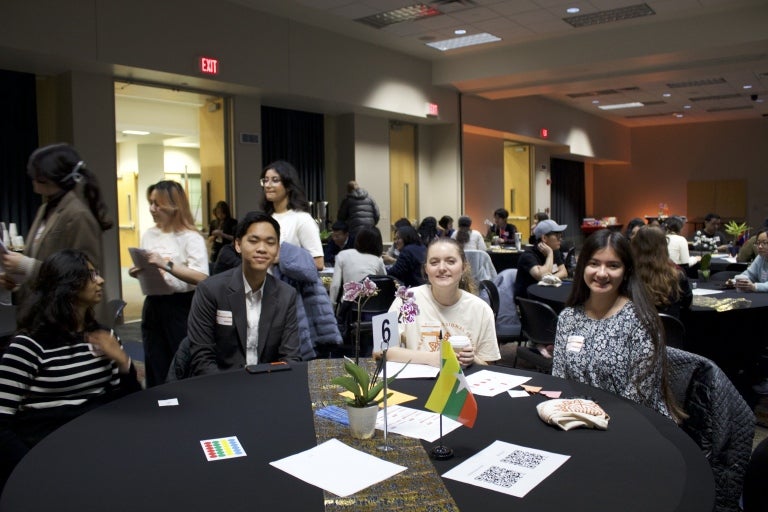
When giving advice to students who are thinking of attending the symposium or becoming a student ambassador, Brooks urges them to go for it.
“It feels like a big title, but it looks really great on the resumé, and having this experience has been really fun,” said Brooks. “I'm so glad I had the opportunity to work behind the scenes after being an attendee.”
Student Ambassador David Perez
David Perez is a junior studying international relations and Asian cultures and languages, with a focus on Japan. He became a student ambassador in 2023, after attending the symposium during his freshman year.
“I really liked the conference,” said Perez. “I liked the opportunity to network with new people who had a strong passion about East and Southeast Asia, and it was really fun to talk with a whole new network of people who were interested in what I'm interested in.”
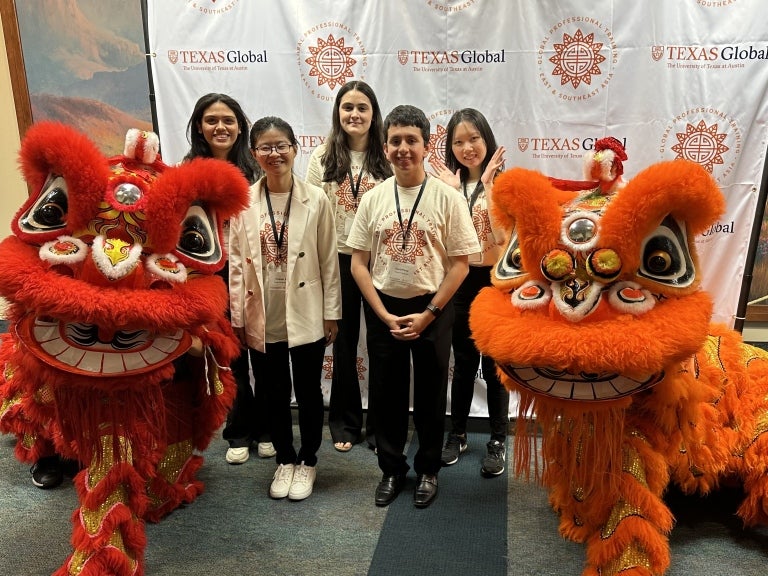
One memory that stood out to Perez was forging international friendships with visiting students from Hiroshima University in Japan.
“I got to speak with two of the students about their work with entrepreneurship in Japan,” said Perez. “We had dinner afterwards, and we got to talk about ourselves and our cultures.”
He continued, “It was really exciting to practice my Japanese and demonstrate my passion for Japanese culture. The following Sunday, I took them to the Capitol and to eat tacos. They only visited for about a week, but we still keep in touch.”
Besides making friends across the world, Perez also described how his experiences at the symposium have made him more accepting and adventurous, inspiring him to study abroad in Tokyo.
“Hearing recent graduates who work in East and Southeast Asia talk about their experience in a new country made me want to go into new challenges and toss myself into the unknown,” said Perez. “Hearing their success stories has definitely made me more open-minded to venture out and seek new challenges.”
For students who might consider applying to be GPT Asia ambassadors, Perez encourages them to muster the courage to put themselves out there and join the community of students passionate about building international careers.
“It might sound nerve-racking at first, having that responsibility and putting yourself in the spotlight,” said Perez. “But just be yourself and share that passion you have.”
To learn more about the program and how to get involved, please visit the Global Professional Training: East and Southeast Asia page on the Texas Global website.

